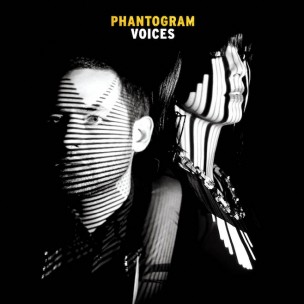
c/o b-sides.tv
Phantogram has returned with its quirky, insistent, and dark style mostly intact. However, the band’s second album, Voices, has a hard time feeling as complete as their debut album, Eyelid Movies. Phantogram’s debut was filled with songs from “When I’m Small” to “10,000 Claps” that were jam-packed with moments that caught listeners off-guard. Voices captures the feeling of unpredictability occasionally but seems forced and commercial at other moments.
The duo, Sarah Barthel and Josh Carter, have undoubtedly been through a lot since Eyelid Movies debuted in 2010. In the past four years, Phantogram has become one of the more popular electro-pop bands. Perfect for late-night chilling, the music is dark with just enough energy to keep the night going. The abrupt changes within songs and interesting beats kept listeners on their toes throughout Eyelid Movies. Unfortunately, in Voices, Barthel and Carter sound as if they have lost the drive or willpower to make music that they are enjoying as much as their listeners.
The album begins with the frenetic, chopped-up beat of “Nothing But Trouble.” From Barthel’s typically enchanting vocals to a crazy, out-of-control synth breakdown, the track certainly leaves an impression. The second track, “Black Out Days,” has an entrancing synth beat that mixes well with the emotional vocals, and is a piece worth multiple listens to fully appreciate its intricacies. It is exemplary of Phantogram’s ability to create a repetitive, captivating beat.
The obvious highlight of the album is “Fall In Love.” It is not only the most recognizable song due to its success as a single, but it is clearly the most fun Phantogram had on Voices. From the electric strings in the intro to Barthel’s goose-bump inducing vocals, “Fall In Love” is a joy to listen to. The fun they had creating the heavy bass that characterized the song is tangible.
From “Fall In Love” the album moves directly into the duo’s first mistake. “Never Going Home” puts the spotlight on Carter’s voice for reasons that escape me. When someone thinks of Phantogram, they think of interesting, eclectic beats and Barthel’s haunting voice. No one views Carter’s vocals as an underutilized tool; there is plenty coming from Barthel. Despite that sentiment, “Never Going Home” and later, “I Don’t Blame You,” feature Carter as the lead. “Never Going Home” in particular had the potential to be a great song, if Carter were replaced with Barthel as the main vocalist.
From the unexciting beat to the lifeless vocals, “Howling At The Moon” is the major blunder of Voices. “Howling at the Moon” is the epitome of the typical electro-pop sound that every band is attempting recently. There is little to nothing unique or fun about the track. The duo’s lack of interest in the song is palpable.
Following the worst song of the album will usually make most subsequent songs sound great, and yet “Bad Dreams” does challenge that notion. The layers of the track do not mix well together. The high-pitched, whiney vocals clash harshly with the heavy synth bass, and the additional drumbeat creates a frenetic felling that does not match the pace of the vocals or the bass.
The highlight of Voices’s second half is easily “Bill Murray.” While the name does lend a certain amount of panache, the slow, ethereal synth and delightfully soft vocals mesh well to create a pleasant, relaxing song. The penultimate track, “Celebrating Nothing,” captures the spontaneity of Phantogram’s past works, using moments of quiet followed by fun bursts of noise.
Voices was not an indie project like Eyelid Movies. Phantogram’s sophomore album was a big label endeavor produced by John Hill, who has worked with Wesleyan’s own Santigold (or Santi White ’97), and it is easy to see the micro-management that has gone into their album from powers above. In Eyelid Movies, Barthel and Carter were spontaneous, creating music that pleased them. Voices does not seem representative of their musical tastes. Although the duo has certainly shown that it still has immense talent, Voices demonstrates the need for Phantogram to get back to its roots. They need to rediscover the urge to be impulsive, and create refreshing music again.